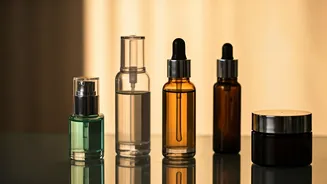Understanding Your Skin
The journey to great skin begins with understanding your unique skin type. Whether you have oily, dry, combination, or sensitive skin, knowing your type is
fundamental. Oily skin often produces excess sebum, leading to shine and potential breakouts. Dry skin, on the other hand, lacks sufficient moisture, potentially resulting in flakiness and tightness. Combination skin exhibits a mix of both, with some areas being oily and others dry. Sensitive skin reacts easily to products or environmental factors, often leading to redness and irritation. Each type needs a tailored approach to maximize effectiveness. A good skin care routine must be personalized to cater to the specific needs of your skin type. Using the wrong products can worsen existing conditions and create new problems.
Essential Skincare Steps
A basic skincare routine involves a few key steps that, when followed consistently, can yield noticeable results. Cleansing, twice a day, washes away dirt, oil, and impurities, preparing the skin for further treatments. The next vital step is exfoliating, which eliminates dead skin cells, promoting a smoother complexion. Serums, packed with potent ingredients, tackle specific concerns like wrinkles, pigmentation, or hydration. Moisturizing is also essential, offering essential hydration and protecting the skin's barrier. Finally, using sun protection every morning, regardless of the weather, shields the skin from harmful UV rays, preventing premature aging and potential skin damage. Adding these steps to your daily life can help transform your skin health.
Key Ingredients Explained
The effectiveness of any skincare routine heavily depends on the ingredients used. Understanding what ingredients to look for can significantly improve results. Hyaluronic acid is a hydration powerhouse, drawing moisture into the skin, while retinoids, a derivative of vitamin A, boosts cell turnover, reducing fine lines and wrinkles. Vitamin C is another important element. A potent antioxidant, protecting skin from environmental damage and brightening skin tone. Ceramides help strengthen the skin barrier, keeping it moisturized and protected from irritants. Always research products and check ingredient lists. Ingredients and product formulations have different results for different people, so understanding them helps make the best choices for your skin's health.
Creating a Routine
Building a good skincare routine doesn’t have to be complicated. Start by identifying your skin type and concerns. Then, choose products that target your specific needs. Begin with a gentle cleanser suitable for your skin type, followed by a serum that addresses your main concern. Apply a moisturizer to hydrate and protect your skin's barrier. During the day, always finish with broad-spectrum sunscreen. Consistency is crucial, so make this routine a daily habit. It's also important to listen to your skin and adjust your routine as needed. If you experience irritation or breakouts, review your products and consider consulting a dermatologist to refine your approach.
Lifestyle's Influence
Skincare is not solely about products; your lifestyle plays a huge role in your skin's appearance and health. A balanced diet rich in fruits, vegetables, and antioxidants helps nourish your skin from within. Adequate hydration, drinking plenty of water, keeps your skin supple and hydrated. Getting enough sleep allows your skin to repair and regenerate overnight, resulting in a fresher, more radiant complexion. Managing stress, through techniques like yoga or meditation, reduces inflammation that can affect skin health. Avoiding smoking and limiting alcohol consumption also helps protect your skin from premature aging and other damage. Incorporating these lifestyle changes supports your skincare efforts, amplifying the benefits of your routine.














